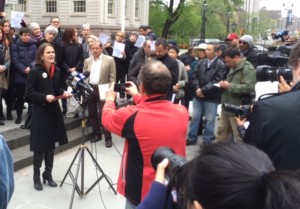It’s time to end pay-to-play real estate deals.
—
From the steps of City Hall, a coalition of community groups from across New York City demanded an end to the “pay to play” relationships between real estate developers, lobbyists and City and State government. Together, we called on U.S. Attorney Preet Bharara to focus his investigations on the quid pro quo political system that repeatedly thwarts community efforts to oppose developers whose money has already guaranteed they have the ear (and favor) of the City and the State.
—

LW! President Kate Wood speaks to the press.
Citing Congregation Shearith Israel, the former First Church of Christ, Scientist, and 711 West End Avenue as cases in point, LANDMARK WEST! President Kate Wood said, “What’s the point of so-called ‘public process’ if the public doesn’t matter? We keep showing up – and speaking up – because we refuse to abandon our city, even though it often feels as though our city has abandoned us….What New York needs now is the political will to end the ‘business as usual’ that destroys our neighborhoods.”
—
Click here for a copy of LW’s full statement.
—
—
Organized by New Yorkers for a Human-Scale City, the rally coincided with the 100th birthday of legendary urbanist and activist Jane Jacobs.
—
Participating groups included:
—
711 West End Avenue Tenants Action Group
Small Business Congress
Bay Improvement Group
Bowery Alliance of Neighbors
Brooklyn Bridge Park Defense Fund
Cobble Hill Association
Committee for Environmentally Responsible Development
Concerned Citizens for Community-Based Planning
Citizens Emergency Committee to Save Preservation
CROWDED
Dumbo Alliance
Friends of Bushwick Inlet Park
Friends of the Seaport
Friends of PS 163
Inwood Preservation
Lower Seaman Tenants Association
Moving Forward Unidos
North Manhattan is Not For Sale
People for Greenspace Foundation
TakeBackNYC
29th Street Association
Vinegar Hill Neighborhood Association
—
Several of these groups contributed to a 25-page dossier of possibly tainted land use deals that harm our neighborhoods. Examples of the kinds of special treatment given to developers engaged in “pay to play” transactions include:
—
- Stalling, ignoring, or pretending “lack of merit” on community-supported requests for landmark and historic district designation.
- Giving applicants for discretionary approvals greater control over the process and access to decision-makers (private meetings, unlimited opportunities to speak at public hearings and meetings) than to private citizen.
- Giving away public assets to private entities.
- Granting special permits and variances when required findings have not been met.
- Lifting of deed restrictions and turning the process of conducting and reviewing environmental impact analysis into a pro forma exercise without substance
- Failure to enforce zoning and building codes when the projects of these developers are involved.
- Ignoring, or selectively applying, agency rules and protocols.
- Ignoring environmental review requirements to examine cumulative impacts of development projects on the public domain or failing to conduct an environmental impact analysis at all.
- Favoring certain developers in projects in which there is a request for proposal process.
- Deliberately failing to enforce planning rules and deals once a project has been negotiated with a community.
